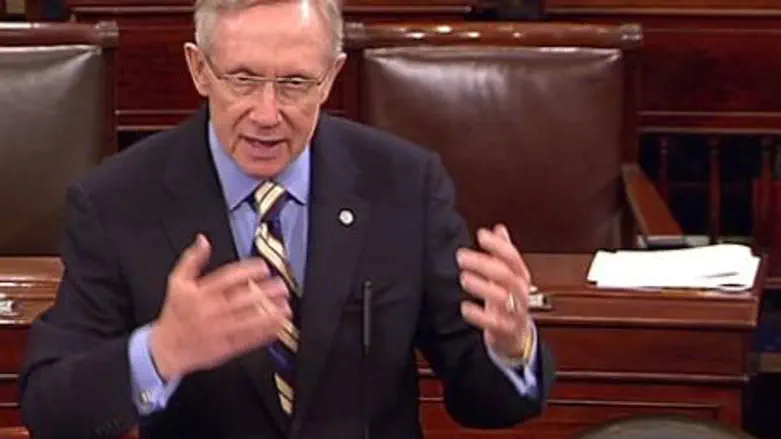
U.S. President Barack Obama’s Democratic majority is turning against him after barely a year in office and is racing ahead of the President to ensure Israel’s security and force harsh sanctions against Iran.
Senate Majority Leader Harold Reid of Nevada, who did not join more than 80 colleagues who recently sent a pro-Israel letter to U.S. Secretary of State Hillary Clinton, fired off his own missive several days ago.
 As the Obama administration increasingly accepts Palestinian Authority demands as non-negotiable, Senator Reid wrote, “I...believe that the United States should clearly and unequivocally state our continuing support for Israel and reiterate the unbreakable bond between the two nations…. I hope that the Obama Administration will do everything possible to reduce recent tensions with Israel while reaffirming the need to move forward with the peace process. I urge you to encourage both sides to participate in direct negotiations, which Prime Minister [Binyamin] Netanyahu has already agreed to do.
As the Obama administration increasingly accepts Palestinian Authority demands as non-negotiable, Senator Reid wrote, “I...believe that the United States should clearly and unequivocally state our continuing support for Israel and reiterate the unbreakable bond between the two nations…. I hope that the Obama Administration will do everything possible to reduce recent tensions with Israel while reaffirming the need to move forward with the peace process. I urge you to encourage both sides to participate in direct negotiations, which Prime Minister [Binyamin] Netanyahu has already agreed to do.
Other leading Democrats, most notably New York Senator Charles Schumer and Representative Anthony Weiner, also have come out swinging against Secretary Clinton’s and President Obama’s unprecedented public condemnation of Prime Minister Netanyahu and Israeli plans to build more residences for Jews in Jerusalem.
The United States does not recognize Israeli sovereignty over parts of the capital where 300,000 Jews now live following the reunification of the city in the 1967 Six-Day War.
Sen. Reid pointedly stated, “A secure Israel is in our national interest.” One of the principle foundations that President Obama has used to advance the PA position for a new Arab state within Israel’s borders is the claim that doing so is in the interests of the national security of the United States.
Sen. Reid also asserted he is "deeply concerned about the continuing threat from Iran’s nuclear weapons program.”
He is among dozens of Congress members who are pushing for legislation to place crippling gas and oil sanctions on Iran, and the Congressional pace appears to be far faster than that of President Obama.
 “We cannot allow Iran to acquire a nuclear weapon which would threaten Israel, our allies in Europe, and our own national interests,” Sen. Reid wrote Secretary Clinton. “We must move forward with a peace process that protects the security of Israel. I strongly believe that our relationship with Israel makes the United States more secure. We cooperate on critical intelligence matters, work together on weapons systems, and rely on Israel as our ally in a volatile part of the world.”
“We cannot allow Iran to acquire a nuclear weapon which would threaten Israel, our allies in Europe, and our own national interests,” Sen. Reid wrote Secretary Clinton. “We must move forward with a peace process that protects the security of Israel. I strongly believe that our relationship with Israel makes the United States more secure. We cooperate on critical intelligence matters, work together on weapons systems, and rely on Israel as our ally in a volatile part of the world.”
His comments offset recent remarks and hints from U.S. Army generals and Obama advisors that the failure to establish a PA state is an obstacle towards reaching an understanding with Iran on its nuclear weapons program.
A joint Senate-House of Representatives conference is to meet Wednesday (today) to try to reach common language on the proposed Iran Sanctions Act, which would force President Obama’s hand.
The executive branch’s initiatives for tough United Nations sanctions have been met by stiff opposition from Russia and China. President Obama’s main achievement at the recent nuclear summit was to gain a handshake and a noncommittal statement from Beijing.
Another obstacle in the president’s way will pop up on May 1, when Lebanon assumes the month-long rotating presidency of the United Nations Security Council. The chances of his fulfilling his vow to pass a resolution for sanctions “within weeks, not months” are near zero.
His apparent failure gives Congress, which has been criticized for deep divisions, a chance to show it is leading the country. The House of Representatives last December passed the sanctions bill by a whopping 411-12 vote.
The bill would punish companies that export refined petroleum products to Iran, which has limited refining capacity despite its vast crude oil reserves. The Obama administration's arguments against the bill are weakening. Fears that it would make it more difficult for the United Nations to pass a resolution on sanctions are less meaningful as the obstacles grow to such a resolution and Iran appears past the point of no return for obtaining nuclear capability.